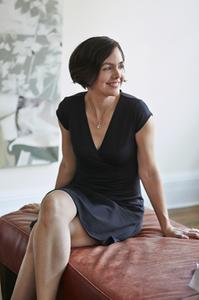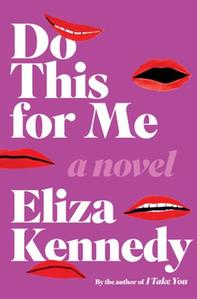
|
|
| photo: Lauren Volo | |
Eliza Kennedy attended the University of Iowa and Harvard Law School, where she was an editor of the Harvard Law Review. After graduation, she served as a law clerk for a federal judge, then practiced litigation for several years at a Manhattan law firm. She lives in New York with her husband and son. Her second novel, Do This for Me (out now from Crown; reviewed below), is the story of New York lawyer Raney Moore--who hilariously burns down her life after discovering her husband's infidelity.
Your first novel, I Take You, also features a female lawyer in New York as its protagonist. Is this because you write what you know, or because lawyers make interesting characters?
A little of both? I was definitely drawing from my own experiences in creating the legal world of the books (my heroines work at the same firm, and Raney is name-checked at the end of I Take You). And lawyers are fun to write about, for sure. We get a bad rap for being dull, but some of the most fascinating, charismatic and deeply neurotic people I've ever met have been lawyers. My real objective, though, was to write about women who had meaningful careers--work lives that mattered to them, and that felt real. Law worked well because I knew what it felt like from the inside, and most of us have at least a passing familiarity with it from the outside.
When Raney Moore discovers her husband's infidelity, she reacts in extreme fashion. Without spoiling anything for readers, she undertakes a series of uproarious actions, separating herself and her teenage daughters from her husband, and nearly ruining his career in the process. How fun was it to write that scene?
Fun to devise, really hard to execute! I started with the kernel of an idea: What if a powerful, driven, take-no-prisoners kind of woman found out that she'd been betrayed? Her husband's affair isn't simply a shock and a heartbreak to Raney--it's a blow against a carefully constructed identity, an existential attack that causes her to doubt everything she believed about her life, her marriage, herself. I wanted her response to be outrageous, yet believable: the bonkers first step on what turns out to be a journey of self-discovery. The difficulty came in figuring out exactly how far she (and I) could go without losing credibility, and trying to keep it funny while showing that the stakes are very real for Raney.
As the novel progresses, Raney undergoes a series of revelations--about her coworkers, about herself and about her marriage. Some of her discoveries are especially timely given the #metoo movement and recent public discussions about sexism in the workplace. Did you find current events shaping Raney's path?
A little bit. The novel's workplace subplot isn't so much about male misbehavior as it is about Raney coming to terms with her own complicity in a toxic culture--her unwillingness to help other women because nobody helped her. That piece was in place before last fall, when the truth about Harvey Weinstein emerged and the MeToo movement really exploded. At that point, I enhanced and deepened the subplot a little bit, but I was wary of going too far. This isn't a book about women at work--it's about one particular, unusual woman, to whom work is important, but who has a life that's much bigger than that. As do we all. Raney is a tough litigator and a bit of an inspiration to some of her colleagues. Have any real-life women lawyers inspired you (either in your law career or in your writing)?
Raney is a tough litigator and a bit of an inspiration to some of her colleagues. Have any real-life women lawyers inspired you (either in your law career or in your writing)?
I've been lucky enough to cross paths with many brilliant and inspiring women lawyers. Two of my professors at Harvard were Elena Kagan and Elizabeth Warren--both were electrifying teachers. After I graduated, I clerked for a year for Judge Miriam Goldman Cedarbaum, one of the first women to graduate from Columbia Law School and an incredibly thoughtful and caring mentor. During my clerkship year, Judge Cedarbaum presided over the Martha Stewart criminal trial (I'm like the Forrest Gump of lawyers, right?), which gave my fellow clerk and me front-row seats to some of the best lawyering in the country. Finally, at my firm, I worked with any number of ambitious, hilarious women, each of whom was a model of how to navigate the professional world.
Just to be clear, none of these people were the inspiration for Raney. They're far more self-aware and put-together.
Can you give us a glimpse at your writing process? Your husband, Joshua Ferris, is also an author. Does that makes things easier or harder?
Most days I'm up at five to get a few hours in before my son wakes up and the morning race begins. Once he's off to school, I spend the rest of the day writing. Over the summer, I hired some guys to build a little writing shed up on the hill behind our house--that's where I work most of the time. It's very peaceful, and even better, has no Internet access.
I'm very lucky to have my husband as my first reader, best critic and head cheerleader/handkerchief provider. I don't know that I would have written my first novel without his encouragement.
Any sneak peeks at what's coming next?
I have a few ideas for novels, but I'm taking a little time to decide. In the meantime, I'm working on the screenplay for Do This for Me and a television project. Transitioning from lawyer to writer has been great in so many ways, but it's a lonely life up there in my writing shed, so I'm enjoying the chance to write more collaboratively. --Jessica Howard, bookseller at Bookmans, Tucson, Ariz.

